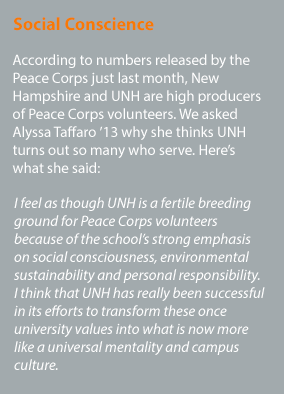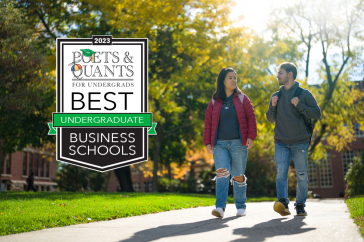
Peñas Blancas is a Costa Rican community of 2,000 people about three hours south of the capital San José. One paved road serves the town, which is known for its sugar cane. Most of the men work in the sugar cane factory; most of the women stay at home.
“Overall, people here have very limited access to economic resources,” says Alyssa Taffaro ’13, who has been in Peñas Blancas since March as a community economic development volunteer for the Peace Corps. “But they tend to maintain a positive outlook on life and are able to find beauty and value in its simplicity.”
Taffaro’s focus is on lifting the community out of its economic doldrums — helping to create sustainable development by working from the ground up on project ideas that come directly from community members. “My approach in Peñas Blancas has been to work very closely with pre-existing, organized groups such as the Development Association, the Microfinance Institution and the Women’s Group, since these are the leaders that shape the future of the community and will continue to do so even after my time working with them is over,” Taffaro explains.
Taffaro has been working with these groups to help them better service their clientele and better market their services. For example, she has facilitated training for the Microfinance Institution’s board of directors on how to calculate interest rates, how to analyze loan requests and how to properly lend and collect money. She’s also helping the institution raise its profile among community members who might benefit from its services by developing a marketing committee and upping its social media presence.
Being abroad is nothing new for Taffaro, who studied overseas twice while pursuing a dual degree in International Business and Economics and International Affairs/Spanish at UNH. While in Spain, she fed the homeless on the streets while working with the organization Solidarios. In Hungary, she taught English at an all‑boys high school once a week. She says the experiences “truly opened my eyes to other ways of life and made me realize that my future could be whatever I wanted it to be.” They also affirmed her love of service work.
It was during her semester in Spain that she got the idea to join the Peace Corps. On a weekend junket to Lisbon, she met an Australian couple that had left their successful engineering careers to pursue full-time humanitarian work in Sub‑Saharan Africa. “They said it was the best decision they ever made,” Taffaro recalls. “After sharing some of my values and interests, they said what I wanted to do sounded a lot like the work of a Peace Corps volunteer. That very night I did some research and realized Peace Corps was my destiny.”
Destined and determined. In addition to the training and marketing efforts, in Costa Rica, Taffaro is teaching English classes to adults twice a week; holding a women’s fitness class five days a week; organizing a group for the elderly; working with Peñas Blancas community members on a park restoration project, and hosting an intensive month-long English camp called JumpStart for students entering high school.
She says every day is different, “and that’s part of what makes this experiment in Peace Corps so unique and exciting.”
A Taste of Home
In November, Taffaro shared the America tradition of Thanksgiving with a group of 12 community members.
“Since no one had an oven, we had to resort to very creative ways to prepare the food,” Taffaro says. “I found a recipe for ‘trash can turkey,’ which is basically a way of cooking the turkey outside using a metal trash can and charcoal … it was a smashing success.” The traditional accouterment rounded out the menu, including, “of course, pumpkin pie.”
“The family was so thankful that I shared this aspect of my culture with them, and I felt extremely grateful to have had such special people to share this important U.S. holiday with. While it is undoubtedly important to teach people about technology and personal budgeting and leadership skills — and to help motivated entrepreneurs get their small businesses up and off the ground — cultural experiences like this one are just as if not more important in the work that I do here.”
Related read: Service to the Corps
Learn more:
UNH Center for International Education
-
Written By:
Tracey Bentley | Communications and Public Affairs




















































